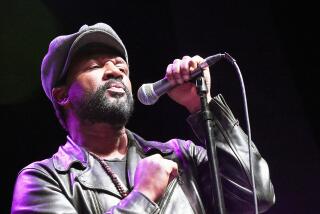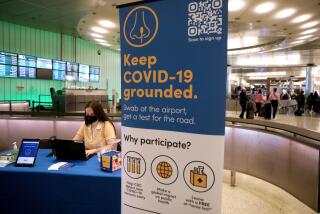Having the Wrong Name Can Hold You Up
- Share via
Having your name on an airport watch list can be nothing but trouble. Just ask James Fenimore Cooper, a Los Angeles banking executive.
Most travelers have heard about the “no-fly” list that keeps people off airplanes. In addition, the federal government maintains an airline security “selectee list.” If your name is a match, you must undergo additional screening before being permitted to board an aircraft.
The government, citing security concerns, won’t divulge how the list is compiled. So passengers who end up on it can only guess why they have been selected -- unless one of the criteria is sharing the name of a 19th century American author.
Cooper, who has not researched his family history far enough back to know whether he is related to the author of “The Last of the Mohicans,” has largely learned how to deal with the inconveniences of being on the selectee list.
The list is frequently confused with the no-fly list, Transportation Security Administration spokesman Nico Melendez said.
The difference is that “no fly” means just that -- if you are listed, you are not allowed on an airplane. Having your name on the selectee list means only that you will be subjected to greater scrutiny.
Both lists, the remnants of a system instituted in 1997, are based on recommendations and information from federal agencies, including law enforcement and intelligence organizations.
Since 9/11, the government has been working for several years to update the system. An initial proposal, for a program called CAPPS II (for computerassisted passenger prescreening system), was scrapped after it ran afoul of privacy advocates and Congress.
Its successor, a system called Secure Flight, is intended to be a more focused check than is done now of passenger information against a consolidated watch list maintained by the government. It will not check for outstanding warrants or use a risk-assessment algorithm as proposed for CAPPS II. Secure Flight also will not use commercial data to verify identities.
Nonetheless, by making use of better information than that used by current methods, Secure Flight will bring down the number of selectees, Melendez said.
“It will revolutionize the whole passenger screening system,” he said.
“It’s not a matter of speed -- it’s a matter of accuracy,” the TSA spokesman said. When Secure Flight is implemented, “the airline won’t be doing the name matching, the federal government will.”
For Cooper and untold others -- the TSA won’t disclose how many names are on the selectee list -- being listed can mean inconsistent experiences from airline to airline. Some airlines prohibit selectees from checking in for flights online. Other carriers prevent passengers from using check-in kiosks.
As a result, with most airlines, “I have to go to the ticket counter,” Cooper said. But he added, “Usually it just takes a couple of seconds.”
That wasn’t the case, however, when he and son James Jr., 16, tried to board a Continental Airlines flight from Los Angeles to Houston last month. Along with Cooper’s wife and daughter, they were on their way for a weeklong Caribbean cruise departing from Galveston, Texas, that afternoon.
James Sr. and Jr. were delayed at the Continental ticket counter because their shared famous name was on the selectee list.
Because it was up to Continental personnel to clear them to board, Cooper knew to arrive early. But as time went on and clearance was nowhere in sight, he sent his wife and daughter ahead, hoping for a last-minute green light for him and his son. It did not come.
By the time the ticket agent received clearance, Cooper said, “the plane had been gone for an hour.”
Continental declined to say how long it should take an agent to clear a passenger on the list. The TSA was not so reticent.
“It should be a very quick process at the ticket counter,” Melendez said.
Once the two Jameses were cleared, Continental placed them on the waiting list for a flight 2 1/2 hours later. When no seats became available, they were booked for a flight nearly four hours after their original departure. That would have put them in port after their boat had departed.
Cooper walked to the Delta Air Lines counter and booked a flight for the next day to Jamaica, where he and James Jr. would meet up with the boat. It cost Cooper an extra $1,800 for him and his son to join the prepaid cruise. Taking no chances, they arrived six hours early for their flight the next day; Delta cleared them in minutes.
Under the contract terms that passengers implicitly accept when they buy their tickets, airlines are exempted from having to pay for damages resulting from such delays. For example, if someone missed signing a business deal because a flight was delayed, the airline would not be liable.
Continental, which says it fulfilled its obligations to the Coopers by scheduling them for the next available flight, may be willing to refund their unused tickets, a spokeswoman said.
Cooper had taken out trip disruption travel insurance, and a claim is being processed with his travel agency.
For fliers like the Coopers, there is no getting off the list.
But they can apply with the TSA for expedited clearance by submitting personal information as well as notarized copies of three documents, such as a passport, birth certificate and driver’s license.
The TSA transmits that information to airlines so they can more efficiently screen passengers. About 32,000 travelers have applied, the agency said.
Although the expedited clearance process isn’t a guarantee of no extra questions, the agency said it should smooth the process and help eliminate delays such as those endured by Cooper and his son.
Cooper has already downloaded the paperwork.
“I’m going to take it to a notary ... and then be sending it off,” he said.
James Gilden can be reached at [email protected].
More to Read
Sign up for The Wild
We’ll help you find the best places to hike, bike and run, as well as the perfect silent spots for meditation and yoga.
You may occasionally receive promotional content from the Los Angeles Times.






